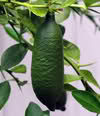| Author |
Message |
Till
Citruholic

Joined: 04 Dec 2012
Posts: 120
Location: Germany (near Frankfurt), Zone 7-8
|
| Posted: Wed 12 Jun, 2013 6:10 am |
|
Hi Millet,
that might be and I would try it if I could. However, I doubt that there is a simple hardiness gene. I think hardiness is a complex matter. The plant needs not only be hardy it must also stop growing, sleep, reduce water, drop its leafs (ideally), be sensitive to day length, mature its fruits early enough and so on. All this features are in Poncirus - exept the taste we want.  But isn't Joe's newly found citrandarin an encouragement?
Greetings,
Till |
|
| Back to top |
|
 |
Millet
Citruholic


Joined: 13 Nov 2005
Posts: 6657
Location: Colorado
|
| Posted: Wed 12 Jun, 2013 12:39 pm |
|
Well than I will change my post to read, "gene or genes", but I doubt that it will come about through Poncirus. But who knows, sometimes truth is stranger than fiction. - Millet |
|
| Back to top |
|
 |
hardyvermont
Citruholic

Joined: 05 Jun 2011
Posts: 61
Location: Anderson, SC
|
| Posted: Wed 12 Jun, 2013 3:32 pm |
|
Till,
I have not heard of this method of grafting onto Satsuma which is grafted onto Poncirus. Where can I find out more?
Thanks
Alan |
|
| Back to top |
|
 |
Sylvain
Site Admin


Joined: 16 Nov 2007
Posts: 790
Location: Bergerac, France.
|
| Posted: Wed 12 Jun, 2013 4:16 pm |
|
It is a Russian method. |
|
| Back to top |
|
 |
Till
Citruholic

Joined: 04 Dec 2012
Posts: 120
Location: Germany (near Frankfurt), Zone 7-8
|
| Posted: Wed 12 Jun, 2013 8:58 pm |
|
I have the method from Bernhard Voss (a German citrus expert, also in this forum). He wrote that in his book "Citruspflanzen: Von tropisch bis winterhart". It was in a short chapter and just only that what I wrote. I am also interested to know more about this method if there is more to know. Maybe other varieties than Satsuma do the same job... |
|
| Back to top |
|
 |
Laaz
Site Owner


Joined: 12 Nov 2005
Posts: 5657
Location: Dorchester County, South Carolina
|
| Posted: Wed 12 Jun, 2013 9:50 pm |
|
You have to remember that different locations will produce different results.
_________________
Wal-Mart a great place to buy cheap plastic crap ! http://walmartwatch.com/ ...
 |
|
| Back to top |
|
 |
Radoslav
Moderator


Joined: 03 May 2008
Posts: 453
Location: Slovak Republic
|
| Posted: Thu 13 Jun, 2013 2:53 am |
|
Speaking about Voss. Some czech citrus growers visited him recently. They said, that he lost all of his plants during winter and after the years of experiments, He ends all attempts to breed a hardy citrus. They said, that he is no longer a citrus grower. |
|
| Back to top |
|
 |
Till
Citruholic

Joined: 04 Dec 2012
Posts: 120
Location: Germany (near Frankfurt), Zone 7-8
|
| Posted: Thu 13 Jun, 2013 6:12 am |
|
Hi Radoslav,
He must have been greatly frustrated at least. At the moment he is (slowly) building up a new homepage. Perhaps he starts anew. I was never sure, however, how much he has bred himself since he was glad to receive a few seeds from the US instead of creating his own and he seemed not to have crucial varieties like the zygotic Poncirus x Changsha cross. Could be that the difficulties of getting good plants (due to this EU-embargo) and lack of time have let him to give up the task. Lets wait for his new homepage. He has at any rate done a lot in that he made so many varieties available for central Europe including the knowledge about their attributes. And I hope that he can add to his breeding successes something more.
But in general, I was surprised that so many citrus enthusiasts in Europe speak about hardy citrus even on their homepages but hardly a person is earnestly breeding new varieties let alone experimenting with technics how we can overcome the crucial hindrances like long juvenile phase and nucellar embryony. And then I red in this great forum about early flowering varieties, plants with a lot of zygotic embryos that are must haves for breeders. (But which I still do not have.) Finally, I came to the conclusion that a lot can still be done and that the most interesting crosses have not yet been done. |
|
| Back to top |
|
 |
ilyaC
Citruholic


Joined: 04 Sep 2009
Posts: 274
Location: France, 40km South of Paris
|
| Posted: Thu 13 Jun, 2013 11:20 am |
|
Tilll,
It is difficult to generalize in the case of citrus hybrids, but two years ago I crossed 5* citrumelo with poncirus.
The seedlings were very poorly growing stunts. Also, I never heard about available cicitranges or cicitrumelos, only their names; no data or photos.
_________________
Best regards,
Ilya |
|
| Back to top |
|
 |
Till
Citruholic

Joined: 04 Dec 2012
Posts: 120
Location: Germany (near Frankfurt), Zone 7-8
|
| Posted: Thu 13 Jun, 2013 11:26 am |
|
Sad to read that, Ilya. Swingle 5* x Poncirus was slower growing than Poncirus?
I only read about cicitranges and cicitrumelos in Swingle's "Citrus industry". He was not extensive there but said that they resember Poncirus very much. Only some, he wrote, are similar to Citranges in that they have bigger leaves. |
|
| Back to top |
|
 |
ilyaC
Citruholic


Joined: 04 Sep 2009
Posts: 274
Location: France, 40km South of Paris
|
| Posted: Thu 13 Jun, 2013 2:19 pm |
|
Till,
Yes indeed they are very close to poncirus in appearance. I still have two of them. Probably shall graft them to poncirus, otherwise no hope to see them mature.
Crosses of 5* with most of other citruses are giving around 5-10% of strong seedlings, growing even faster than rare polyembryonic 5*s. Zygotic selfs are mostly dwarfs.
_________________
Best regards,
Ilya |
|
| Back to top |
|
 |
Till
Citruholic

Joined: 04 Dec 2012
Posts: 120
Location: Germany (near Frankfurt), Zone 7-8
|
| Posted: Thu 13 Jun, 2013 5:48 pm |
|
Ilya, I would definitely keep them. Who knows, perhaps they are interesting. And as long as you have the space... I red about zygotic offspring of citranges that it is also usually weak. But if not weaker growing than Poncirus then it might be interesting. And great when you have stronger plants, too.
Another matter, regarding the identification of good genes: I think that is indeed a difficult point. For a short overview over the existing citranges shows that good genes (in term of good fruits) are often hidden. I have no reason to believe that a half orange like Morton has better genes than a half orange like Carizzo. So I would not care at all about taste in the first generation. The frustrating fact seems to be that genes are somehow arbitrarily expressed or suppressed and come only to appearance when they are split off into two different plants, i. e. in the second generation. Of cause if a citrange or citrumelo tastes relatively good then it is a good sign. But bad taste does not proof the absence of good genes, so it seems to me. |
|
| Back to top |
|
 |
Sludge
Citruholic

Joined: 16 Mar 2009
Posts: 55
Location: Northern California
|
| Posted: Mon 08 Jul, 2013 1:47 pm |
|
I've often wanted to try recreating the Thomasville using something more hardy in place of the Orange in the citrange parent. Maybe do a [ichang papeda X poncirus] X Nagami kumquat.
Anyway on the subject of genetic engineering cold hardy citrus, I was discussing this possibility on another forum and someone brought up an interesting point. Given how complex of a trait cold tolerance is, maybe it would be easier to genetically engineer a poncirus without the unpleasant flavor compounds. |
|
| Back to top |
|
 |
Till
Citruholic

Joined: 04 Dec 2012
Posts: 120
Location: Germany (near Frankfurt), Zone 7-8
|
| Posted: Tue 09 Jul, 2013 5:23 pm |
|
Hi Sludge, just try. Your idea could be really good since C. ichangiensis is said to suppress the resin taste - at least according to Dr. Brown. I am thinking about (Poncirus X C. keraji) * Nagami. That may be sweeter. However, Thomasville is the only sweet citrangequat. So not so encouraging for somebody hoping for sweetness. |
|
| Back to top |
|
 |
Millet
Citruholic


Joined: 13 Nov 2005
Posts: 6657
Location: Colorado
|
| Posted: Tue 09 Jul, 2013 5:53 pm |
|
I grew a Thomasville Citrangequat at one time. I agree with Till, in that if you leave the fruit hanging on the tree for an extended time period the fruit does become somewhat acceptable. However, I would not say that "sweet" would be a correct description of the fruit's taste. After I grew the tree for a while I tossed it out onto the compost pile, as I thought the fruit never developed a taste worth the time nor the effort to grow it. Still Till is correct that Thomasville is probably the "best" of the many citrange varieties. . - Millet |
|
| Back to top |
|
 |
























